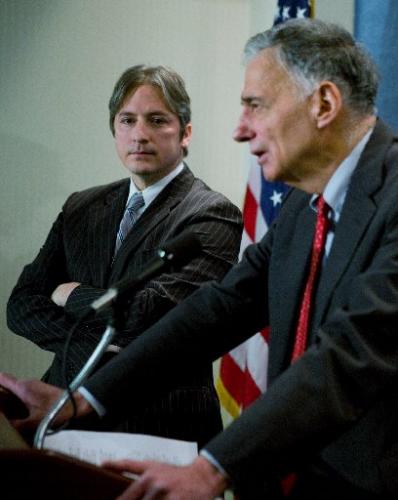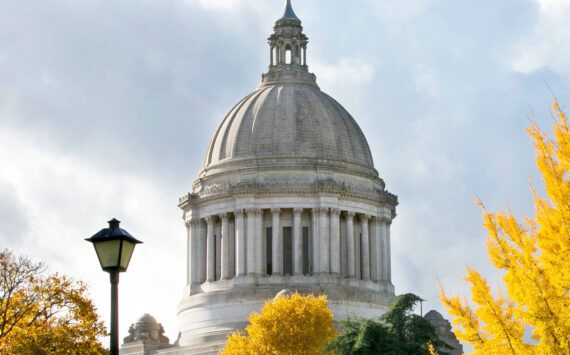The U.S. presidential campaign is in the news every day. The story is usually about the Democratic nomination battle. Once that’s settled, the nominee will face McCain and the general election will be in full gear. But there are other storylines regarding the race that get little mention. Last week, the Constitution Party nominated their presidential candidate. Green Party nominations are underway.
Ralph Nader did make significant news when he announced his independent candidacy last February. He got coverage, but not because of his policy proposals—because of his history as a candidate. His name has become almost synonymous with the epic 2000 presidential battle in Florida. The story goes like this: if Nader hadn’t been on the ballot there, Al Gore would have gotten enough votes to beat Bush and win the electoral college. Nader’s participation in the 2000 election has gotten a lot of play regarding the spoiler vote in countless explanations of the Ranked Choice Voting process.
There is also the perception of Nader as a perennial candidate. Some are quick to dismiss him, but Nader has chosen a running mate with solid experience and a promising future in politics.
Matt Gonzalez was hired as a deputy public defender in San Francisco in 1991. In 2000, Gonzalez was elected to the 11-member San Francisco Board of Supervisors, which manages a city with a budget of $6 billion. He became President of the Board three years later. In 2003, he ran a competitive campaign against Gavin Newsom for mayor of San Francisco and came close to winning.
I was first introduced to Matt in 2006. It was at a fundraiser for Oakland’s Ranked Choice Voting campaign. The event was at the San Francisco office of the law firm of Gonzalez & Leigh. In anticipation of his visit to Seattle this weekend, we recently shared this e-mail exchange about the Nader/Gonzalez campaign and other things political.
NOVOSELIC: Why are you running for vice president, and why with Ralph Nader?
GONZALEZ: No one’s ever asked me to be their running mate, and in Nader’s case it was easy to say yes. He’s a giant figure in American society and has set the benchmark for what an engaged citizen is. Why run? Mostly to sound an alarm that the political discourse in this country is too narrow, and that the candidates many voters are placing their hopes in are sadly not likely to achieve anything close to their rhetoric.
NOVOSELIC: Please state some policy proposals of the Nader/Gonzalez ticket.
GONZALEZ: Single-payer health care, ending the war in Iraq (without leaving any of the private contractor soldiers there), and ending the corporate domination of our society. It’s apparent that corporate money is undermining good government decision-making in our legislative process.
We’re committed to election reform. We support proportional representation for our Congress and direct election of the president by majority vote. We oppose plurality victories, which are common in the U.S., and have occurred in eight of the last 24 presidential contests.
NOVOSELIC: Why is it an independent bid and not with a party?
GONZALEZ: Nader’s never been a member of a political party to my knowledge, and since the Greens insisted on nominating a party member four years ago, it seemed best to run as Independents.
NOVOSELIC: How are things progressing with your ballot access in the states?
GONZALEZ: We’re already officially on the ballot in New Mexico and Hawaii and we’re projecting another 43 ballot lines.
NOVOSELIC: Washington is going to use a partisan top-two election system in August and November. Putting associational issues aside, what is your experience/thoughts with runoff elections?
GONZALEZ: The old method of party nominations hasn’t exactly gotten us an elected body to swoon over. So why not try something different? When I ran for mayor of San Francisco, it was essentially an open primary where the top two proceeded into a runoff. Because the field of candidates was large, I got into the runoff with 19 percent of the vote, then nearly won with 47 percent.
NOVOSELIC: You were instrumental in San Francisco’s adoption of Ranked Choice Voting. Tell me about the resistance to this reform in SF. Also, how is RCV working and how has it changed things with elections in SF?
GONZALEZ: There were many fears people wouldn’t be able to figure it out. But it’s as simple as choosing ice cream at an ice cream parlor. If they don’t have your first choice (strawberry in my case), then you look for your second choice (chocolate), then your third (vanilla, I guess). In San Francisco none of the fears materialized. It’s saved a bunch of money because we eliminated the need for a second election to learn a voter’s runoff choices and voters have said they prefer it to the old system.
NOVOSELIC: Finally, besides your campaigning and law practice in California, are you working on any art pieces? I liked your collage work, and your office had nice paintings from other artists.
GONZALEZ: I’ve been exhibiting paper collage pieces. My next show, “Crossing the Delaware,” opens May 15 in Oakland, California, at Johansson Projects and includes work I’ve made since running for vice president. The title is tongue-in-cheek. I told Nader I was only running with him to boost my collage career. We’ll have to see if it works.




